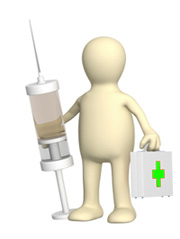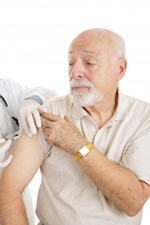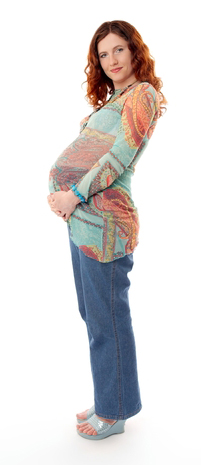FLU SEASON IS HERE!
THERE IS STILL TIME TO HAVE YOUR FLU VACCINATION. Please call the surgery to book an appointment.
Some patients may be eligible other vaccinations such as pneumococcal and shingles you will be informed about this when you come for your appointment.
Vaccinations
Through out your life you will may require different vaccinations to protect you against illness. These may change depending on your current situation, health or age.
Keep reading for information on Childhood immunisation schedule, influenza vaccination and vaccinations during pregnancy.
Children's Immunisation Schedule
Here's a checklist of the vaccines that are routinely offered to everyone in the UK for free on the NHS, and the age at which you should ideally have them.
2 months:
- Diphtheria, tetanus, pertussis (whooping cough), polio and Haemophilus influenzae type b (Hib, a bacterial infection that can cause severe pneumonia or meningitis in young children) given as a 5-in-1 single jab known as DTaP/IPV/Hib
- Pneumococcal infection
- Meningitis B
- Rota-virus (Gastroenteritis)
 3 months:
3 months:
- 5-in-1, second dose (DTaP/IPV/Hib)
- Rota-virus, second does (rota)
4 months:
- 5-in-1, third dose (DTaP/IPV/Hib)
- Pneumococcal infection, second dose
- Meningitis B
12 months:
- Meningitis B, third dose
- Meningitis C / Hib, fourth dose (Hib/MenC given as together in one injection)
- MMR (measles, mumps and rubella all given as together in one injection)
- Pneumococcal infection, second dose
3 years and 4 months, or soon after:
- MMR second jab
- Diphtheria, tetanus, pertussis and polio (DtaP/IPV), given as a 4-in-1 pre-school booster
Around 12-13 years:
- Cervical cancer (HPV) vaccine, which protects against cervical cancer (girls only): three jabs given within six months
Around 13-18 years:
- Diphtheria, tetanus and polio booster (Td/IPV), given as a single jab
- Meningitis ACWY
65 and over:
- Flu (every year) for information on the flu vaccination clinics click HERE
- Pneumococcal
70 - 80 years:
- Shingles - Shingles is a common disease and the risks and severity of shingles increases with age. The most common complication of shingles is post-herpetic neuralgia (PHN), which can have a significant impact on patient quality of life die to often persistent and severe pain.
HPA Childrens Vaccination Schedule
Click here for the recommended HPA vaccination schedule
Seasonal Flu Vaccination
Influenza – flu – is a highly infectious and potentially serious illness caused by influenza viruses. Each year the make-up of the seasonal flu vaccine is designed to protect against the influenza viruses that the World Heal th Organization decide are most likely to be circulating in the coming winter.
th Organization decide are most likely to be circulating in the coming winter.
Regular immunisation (vaccination) is given free of charge to the following at-risk people, to protect them from seasonal flu:
- people aged 65 or over,
- people with a serious medical condition
- people living in a residential or nursing home
- the main carers for an elderly or disabled person whose welfare may be at risk if the carer becomes ill
- healthcare or social care professionals directly involved in patient care, and
- those with a BMI greater than 40.
Please note that people in the 50 to 64 year old age group will not be vaccinated until December, providing there is sufficient vaccine, and no appointments will be offered for this age group until then. This is to ensure that those who are most at risk are vaccinated first. If you are 50 to 64 and you are in one of the other groups which is eligible for the flu vaccination, for example you have a health condition which puts you at risk from flu, you will be invited earlier.
Travel Information
If you require any vaccinations relating to foreign travel, please make an appointment with the practice nurse to discuss your travel arrangements. This will include which countries and areas within countries that you are visiting to determine what vaccinations are required. There is further information about countries and vaccinations required on the links below.
Due to changes with the new state backed indemnity service, which covers NHS Staff, we are no longer able to administer some travel vaccinations.
It is important to make an initial appointment with either nurse Jeanette or Bosy, as early as possible before you travel. They will advise which vaccinations you will need and give other helpful travel advice. You will need to complete a travel questionnaire and bring to your appointment.
Some vaccines are available free on the NHS and can be given at the time of the initial appointment. These vaccinations include:
A second follow up appointment may be necessary for booster vaccinations.
Some travel vaccines are not covered under the NHS, and therefore can not be given at the surgery. These include:
Some pharmacies or travel clinics can provide these vaccinations.
VACCINATIONS DURING PREGNANCY
Pregnant women & the Flu Vaccination
It is recommended that all pregnant women should have the flu vaccine, whatever stage of pregnancy they're in. This is because there is good evidence that pregnant women have an increased risk of developing complications if they get flu, particularly from the H1N1 strain.
Studies have shown that the flu vaccine can be safely and effectively given during any trimester of pregnancy. The vaccine does not carry risks for either the mother or baby. In fact, studies have shown that mothers who have had the vaccine while pregnant pass some protection to their babies, which lasts for the first few months of their lives.
Whooping Cough Vaccinations will be offered to Pregnant Patients who are 28 - 38 weeks pregnant.

You will receive your Flu Vaccinations Letter via the post to ask you to come to the Surgery. Those Pregnant patients who are within 28-38 weeks of their pregnancy, please ask the Nurse who is giving you the Flu Vaccination, for the Whooping Cough Vaccination on the day.
In the UK, all pregnant women are now to be offered vaccination against whooping cough when they are 28-38 weeks pregnant. Getting vaccinated while you’re pregnant could help to protect your baby from developing whooping cough in its first few weeks of life. Children are vaccinated against whooping cough at two, three and four months of age, and again before starting school at about three years and four months of age. Read more about preventing whooping cough
here.
Although the number of cases of whooping cough has fallen dramatically since vaccination began, it is still possible for children to get the infection, so having the vaccination is vital.
The more people vaccinated against whooping cough the less chance there is of them passing on the infection to a young baby in which it could cause serious, and possible fatal, complications.
The effectiveness of the whooping cough vaccination may fade over time meaning it is possible to develop the condition during adulthood if you were previously vaccinated.
For more information, please click here.